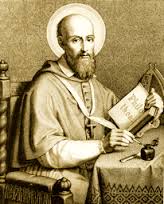Saint Francis de Sales (1567-1622), Bishop of Geneva and Doctor of the Church, is the patron saint of writers, not surprisingly, given his very readable, apt, direct, clear spiritual works, which have stood the test of time, and can be read today with as much benefit as they could in the 16th century.
After a period of self-doubt, convinced he was predestined to hell, Francis devoted himself to Our Lady, realizing that ‘God is good’, and wills the salvation of all. He decided, against his father’s wishes, to become a priest, and in his ministry was known for his gentleness, and for expressing the moral law and Catholic prescriptions in a way that made them ‘make sense’, full of homey, cheery and realistic advice: That families should indeed be concerned about ‘increasing their income’, and it would be wrong for the head of such a household to spend all day in the church. The monk and priest should be concerned about their own vocations, which bring their own joys, and sorrows, and have their particular form of devotion. We should not be envious of each other, but rejoice that there are as many paths to heaven as there are human beings:
When God the Creator made all things, he commanded the plants to bring forth fruit each according to its own kind; he has likewise commanded Christians, who are the living plants of his Church, to bring forth the fruits of devotion, each one in accord with his character, his station and his calling.
… Therefore, in whatever situations we happen to be, we can and we must aspire to the life of perfection.
Saint Francis, with his priestly ministry of preaching, hearing confession, his words and example, converted untold numbers of newly-minted Protestants back to the one, true Faith, a hearty reminder in this week of Christian unity that unity is something the one true Church already has. The task is to increase this unity, by building ecumenical bridges with those who are distanced from such unity. The best way to do so, as the Second Vatican Council’s document on ecumenism, Unitatis Redintegratio, reminds us, is by our own interior conversion, and by the Church, and all our own local churches, becoming fully who and what they are meant to be.
Bishop Francis would have heartily agreed.
The restless King of France, Henry IV, himself a convert, remarked upon meeting Francis:
A rare bird, this Monsieur de Geneve, he is devout and also learned; and not only devout and learned but at the same time a gentleman. A very rare combination
Indeed. Would that we had far more learned and holy gentlemen.
Ora pro nobis, good and gentle saint.


